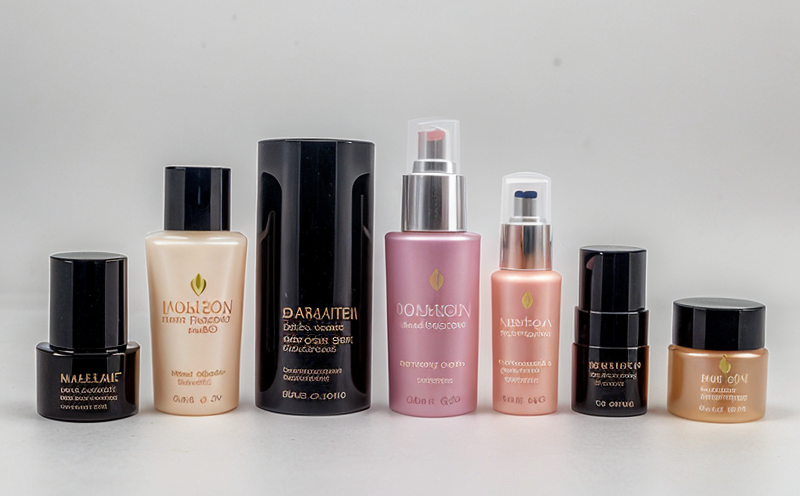Comprehensive Packaging Interaction and Migration Testing for Cosmetics
When it comes to packaging interaction and migration testing in cosmetics, ensuring product safety and compliance with regulatory standards is paramount. This service focuses on assessing the potential transfer of chemicals from packaging materials into cosmetic products during storage and usage. The primary goal is to prevent any adverse effects on consumers' health by minimizing exposure to potentially harmful substances.
The importance of this testing cannot be overstated, especially given the increasing demand for transparency in ingredient disclosure and the growing number of regulations aimed at protecting consumer safety. Packaging materials such as plastics, metals, glass, and paper can interact with cosmetic ingredients, leading to migrations that may alter product quality or pose health risks.
At Eurolab, we offer a range of comprehensive testing services designed to meet your specific needs in this area. Our experts use state-of-the-art equipment and follow internationally recognized standards like ISO 10350-4:2016 and ASTM D7891 to ensure accurate and reliable results.
Our services include:
- Determination of migration limits for various packaging materials
- Analysis of specific chemical compounds that may migrate into cosmetic products
- Evaluation of the stability and shelf-life of cosmetic products during prolonged storage with different packaging types
- Assessment of compatibility between packaging materials and cosmetic formulations
The testing process involves meticulous sample preparation, rigorous analysis using advanced analytical techniques such as Gas Chromatography-Mass Spectrometry (GC-MS), Liquid Chromatography-Tandem Mass Spectrometry (LC-MS/MS), and Fourier Transform Infrared Spectroscopy (FTIR). These methods allow us to detect even trace amounts of migrated substances, providing you with precise data on potential health hazards.
In addition to analytical testing, we also provide consultancy services to help you choose the most suitable packaging materials for your cosmetic products. Our team will work closely with you to understand your product specifications and requirements, ensuring that our recommendations align perfectly with both regulatory expectations and consumer safety standards.
Our commitment to excellence extends beyond just technical expertise; it includes providing clear reports that are easy to interpret and actionable. You receive detailed insights into the testing process, findings, and recommendations for future improvements or adjustments in your packaging strategy.
Scope and Methodology
| Aspect | Description |
|---|---|
| Sample Preparation | Properly cleaned and conditioned samples are prepared according to standard operating procedures. |
| Analytical Techniques | Incorporation of GC-MS, LC-MS/MS, FTIR for precise identification and quantification of migrated compounds. |
| Testing Parameters | Different storage conditions (temperature, humidity) to simulate real-world scenarios. |
| Acceptance Criteria | Compliance with relevant international standards such as ISO 10350-4:2016 and ASTM D7891. |
The testing methodology follows strict guidelines set forth by recognized bodies to ensure consistency and accuracy. Our laboratories are equipped with the latest technology, ensuring that every test conducted is up-to-date with current scientific knowledge and practices.
Industry Applications
- Ensuring compliance with regulatory requirements for cosmetic packaging materials.
- Identifying potential health risks associated with migrated substances in packaged cosmetics.
- Selecting appropriate packaging solutions that enhance product quality and safety.
- Avoiding recalls due to non-compliance or adverse reactions from consumers.
Our testing services are applicable across various sectors within the cosmetic industry, including but not limited to:
- Manufacturers of personal care products such as shampoos, lotions, and makeup.
- Retailers who need assurance about the safety of their stocked items.
- R&D departments seeking innovative packaging solutions that do not compromise on product integrity.
The insights gained from our testing can significantly impact decision-making processes related to new product launches or modifications in existing formulations and packages. By leveraging these data points, companies can enhance consumer trust while adhering strictly to global standards.
Eurolab Advantages
- Expertise: Our team comprises highly qualified professionals with extensive experience in cosmetic science and packaging technology.
- Technology: Utilize cutting-edge analytical tools to provide accurate, reliable test results.
- Compliance: Stay ahead of regulatory changes by adhering strictly to international standards.
- Service: Tailor our services to meet individual client needs through personalized consultations and support throughout the testing process.
We understand that every business has unique challenges when it comes to ensuring product safety. That’s why we offer flexible solutions that cater specifically to your requirements, whether you are a small startup or a large multinational corporation.
Trust Eurolab for all your packaging interaction and migration testing needs in the cosmetic industry. Together, let’s ensure that every package meets not only regulatory standards but also surpasses expectations in terms of consumer safety and satisfaction.





